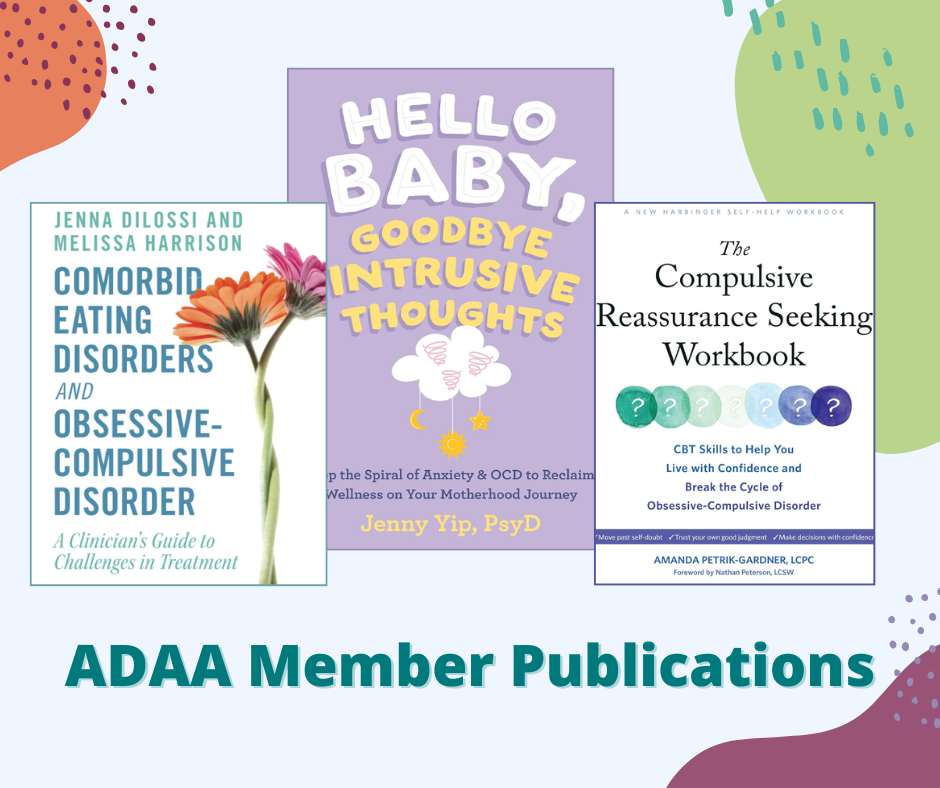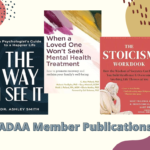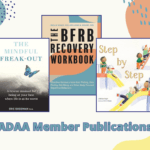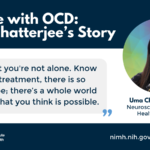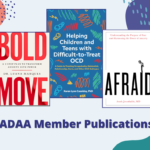Essential Guide for Clinicians Treating Patients with Co-occurring Eating Disorders and OCD
Until recently, there has been a notable absence of comprehensive literature specifically addressing the intricate challenges faced by individuals diagnosed with both an eating disorder and obsessive-compulsive disorder (OCD). This gap is especially significant in the realm of clinical guidance for health professionals, who often lack the tools and strategies necessary for effectively treating patients grappling with these dual diagnoses. The need for a dedicated clinician’s guide that encompasses the complexities of both disorders is paramount.
ADAA member authors Jenna DiLossi, PsyD, ABPP, and Melissa Harrison, MA, LPC, bring a wealth of clinical expertise to this topic. They have a rich history of treating patients with both eating disorders and OCD, in addition to their roles as presenters at numerous conferences focused on mental health. The authors emphasize that while the literature documents the diagnostic overlap between these conditions, there remains a significant scarcity of clinical resources that effectively navigate this “tricky presentation.”
With their new publication titled Comorbid Eating Disorders and Obsessive-Compulsive Disorder: A Clinician’s Guide to Challenges in Treatment, the authors aim to bridge this gap. Research indicates that individuals suffering from eating disorders often experience higher rates of OCD and vice versa. Witnessing these patients in their outpatient practice, Dr. DiLossi and Harrison felt compelled to create a resource for fellow clinicians who may encounter similar challenges in their own practices.
“Our vision for the book is that it be used as a supplemental tool to provide evidence-informed guidance for clinicians in practice,” Dr. DiLossi shared with ADAA. “We aspire to contribute to the development and empirical examination of a systematic treatment protocol for this challenging presentation in the future.”
This insightful book offers a plethora of resources, including case studies, common clinical pitfalls, assessments, and recommended treatment strategies. It meticulously outlines the overlap between eating disorders and OCD, highlighting how their comorbidity alters clinical presentations. However, the authors also delve into the human aspect, candidly discussing the importance of empathy and emotional connections with patients as essential components of effective treatment.
“It is crucial for clinicians to have an understanding of the foundational theories that underpin behavioral interventions for these patients,” Harrison emphasized. “Equally important is having a realistic view of each patient’s core fears, potential individual outcomes, and their capacity to cope, especially regarding the biological ramifications of being malnourished and underweight, which can exacerbate obsessional thinking and compulsive behaviors.”
While primarily aimed at clinicians, the authors have designed this book to also benefit students, interns, and postdoctoral fellows who may not yet have experience with this population but are eager to learn about one or both diagnoses.
“We are incredibly grateful to the patients who have trusted us with their care over the years,” the authors expressed to ADAA. “Each of their journeys has been invaluable for our understanding of this diagnostic presentation and has significantly influenced the development of this book.”
Order Comorbid Eating Disorders and Obsessive-Compulsive Disorder: A Clinician’s Guide to Challenges in Treatment here.
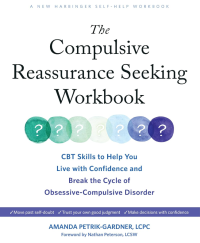
Empowering Strategies for Managing Compulsive Reassurance Seeking in OCD: A Workbook for Clients
The act of giving and receiving reassurance is an innate part of the human experience, fostering connections and promoting feelings of validation and understanding. While this behavior is generally considered healthy, it can become problematic when the pursuit of reassurance spirals into an uncontrollable cycle of obsessive-compulsive behavior, ultimately undermining mental health and productivity.
ADAA member Amanda Petrik-Gardner, LCPC, has recognized this pressing issue in her work with clients and their families, leading her to develop a comprehensive step-by-step workbook designed to address the challenges posed by excessive reassurance seeking. This compulsive behavior often disrupts daily functioning and places undue stress on relationships with family and friends.
In her newly released workbook, The Compulsive Reassurance Seeking Workbook: CBT Skills to Help You Live with Confidence and Break the Cycle of Obsessive-Compulsive Disorder, Petrik-Gardner provides valuable tools aimed at reducing compulsive behaviors, fostering acceptance of uncertainty, and enhancing overall management of OCD. Rooted in cognitive behavioral therapy (CBT), this workbook elucidates how compulsive reassurance seeking can hinder personal relationships, offering effective coping strategies that avoid the pitfalls of compulsive questioning.
Petrik-Gardner notes that compulsive reassurance seeking can be exhausting and is often a “sneaky and complex compulsion.” Clients may not even realize they are engaging in this behavior, while families often struggle to recognize how constant reassurance can be counterproductive. This lack of awareness leaves both clients and their loved ones unsure of how to break free from this debilitating cycle.
“Such behaviors frequently lead to increased conflict, stress, and anxiety for both you and those closest to you,” shared the ADAA member. “It’s time to foster an internal sense of reassurance that cultivates genuine well-being, self-worth, and peace of mind.”
This workbook is primarily intended for individuals grappling with OCD, though it also offers valuable insights for loved ones and professionals. It features evidence-based treatment options, user-friendly exercises, and inspirational stories designed to motivate readers on their journey toward recovery.
<p“As a specialist in OCD with personal experience, I shared many of my own stories throughout the workbook,” Petrik-Gardner revealed to ADAA. “My aim was to deliver relatable information that resonates with all readers.”
The author aspires for readers to experience a sense of normalization and hope while equipping them with a diverse array of tools for improvement. She emphasizes that not all reassurance is detrimental, particularly when it stems from curiosity or information gathering. However, recognizing when reassurance seeking transforms into a compulsive behavior is vital, as is understanding the array of treatment options available.
Order The Compulsive Reassurance Seeking Workbook: CBT Skills to Help You Live with Confidence and Break the Cycle of Obsessive-Compulsive Disorder here.
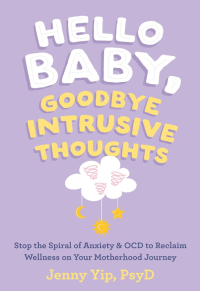
Transforming Motherhood: Strategies for Overcoming Intrusive Thoughts and Finding Peace
Motherhood is a journey filled with both joys and challenges, and it is common for mothers to experience anxiety at some point. Whether an expectant mother, a new mom, or a seasoned parent of multiple children, the demands of motherhood can lead to physical exhaustion, mental fatigue, emotional vulnerability, frustration, and even chronic burnout.
ADAA member Dr. Jenny Yip, PsyD, ABPP, acknowledges the abundant joys of motherhood but also understands the unique pressures that come with caring for children. As a mother of twin boys, an expert in parenting and OCD, an author, and a renowned speaker, she recognizes the complexities involved in fulfilling multiple roles simultaneously, often leading to feelings of depletion.
In her latest book, Dr. Yip provides heartfelt support for mothers whose worries and anxieties have escalated beyond what is considered normal, adversely affecting their daily functioning. Hello Baby, Goodbye Intrusive Thoughts: Stop the Spiral of Anxiety and OCD to Reclaim Wellness on Your Motherhood Journey offers insights into motherhood at various stages, focusing on anxiety and OCD, as well as the disturbing intrusive thoughts that can impact many mothers.
Employing evidence-based cognitive behavioral (CBT) techniques and exposure and response prevention (ERP) strategies, the book presents practical approaches for mothers to lessen the time spent in anxious thoughts and instead foster deeper connections with their children. Drawing from her own experience with postpartum OCD, Dr. Yip shares both professional and personal insights throughout the text.
<p“Within the book, I share my own journey with postpartum OCD,” Dr. Yip explained to ADAA. “What I discovered is that we must learn to tolerate uncertainty. We need to be comfortable with the idea of the worst-case scenario without allowing it to paralyze us. Living authentically with our families, being emotionally available, and accepting that anything can happen is vital.”
Hello Baby, Goodbye Intrusive Thoughts equips mothers with a practical toolbox filled with step-by-step exercises, touching stories from moms around the world, and the latest scientific research aimed at helping mothers cultivate habits that strengthen the parent-child bond and reclaim their wellness during the motherhood journey.
“It is crucial for mothers to prioritize their own self-maintenance, as this is not merely about self-care,” Dr. Yip emphasizes. She likens self-maintenance to regular vehicle maintenance, underscoring that neglecting self-care can lead to breakdowns in both physical and mental health.
Self-care may be optional, she clarifies, but self-maintenance—implementing strategies to address intrusive thoughts and letting go of the need for perfection—should be mandatory for mothers seeking balance and peace.
Order Hello Baby, Goodbye Intrusive Thoughts: Stop the Spiral of Anxiety and OCD to Reclaim Wellness on Your Motherhood Journey here.
!function(f,b,e,v,n,t,s)if(f.fbq)return;n=f.fbq=function()n.callMethod?n.callMethod.apply(n,arguments):n.queue.push(arguments);if(!f._fbq)f._fbq=n;n.push=n;n.loaded=!0;n.version=’2.0′;n.queue=[];t=b.createElement(e);t.async=!0;t.src=v;s=b.getElementsByTagName(e)[0];s.parentNode.insertBefore(t,s)(window,document,’script’,’//connect.facebook.net/en_US/fbevents.js’);
fbq(‘init’, ‘1547202075599663’);
fbq(‘track’, “PageView”);
